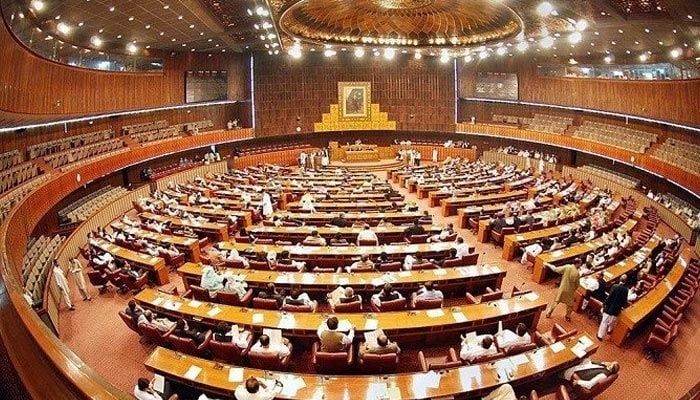No trust resolution: A test for both the opposition and the government
A no-confidence motion is considered to be an integral part of a democratic and parliamentary system
February 18, 2022

The announcement by the opposition parties to present a no-confidence motion against the PTI-led government in the National Assembly has increased the political temperature in the country. All major news stories are about anti-government statements by opposition leaders and their attempts to seek support from the ruling party’s allies. Similarly, the focus of government spokespersons is on handling the chaotic situation created by the opposition’s decision.
A no-confidence motion is considered to be an integral part of a democratic and parliamentary system. The first no-confidence motion in the world’s parliamentary history was tabled against British prime minister Lord North in 1782, when the legislators expressed their anger over the defeat of the British force during the siege of Yorktown in 1781. Similarly, more than two dozen no-confidence motions were tabled in our neighbouring country India. At least three elected prime ministers, Vishwanath Pratap Singh, H D Gowda and Atal Bihari Vajpayee were ousted by no-confidence votes.
Under the rules of procedure and conduct of business in the National Assembly of Pakistan, the opposition has the right to move a no-confidence motion. “The resolution shall not be voted upon before the expiry of three days, or later than seven days, from the day on which the resolution is moved in the Assembly,” it further mentioned.
The procedure for the motion against the prime minister is by open voting while a secret ballot is adopted to remove the speaker and deputy speaker of the National Assembly, and the chairman and deputy chairman of the Senate. Regardless of the procedure, it is the responsibility of the proponents to complete the required number in the assemblies.
Unlike in other countries in the world, the no-confidence motion has never been successful in Pakistan. In 1989, the opposition moved a no-confidence motion against then prime minister Benazir Bhutto. At that time, Nawaz Sharif, the then chief minister of Punjab, was in a tussle with the PPP-led federal government. There were speculations that Ghulam Mustafa Jatoi – the then opposition leader – would be prime minister if the no-confidence motion was successful. Such rumours created mistrust among the opposition parties, and the first no-confidence motion in our parliamentary history failed.
Later, in 2006, the opposition’s no-confidence motion against former prime minister Shaukat Aziz also failed. Former speaker Chaudhry Amir Hussain twice fought a failed no-confidence motion against him.
Several analysts are now speculating the result of the upcoming motion. I can say with confidence, based on my political experience over the last two decades, that today we are facing a different situation on the political front.
In the past, there were inexperienced politicians who tabled the no-confidence motions against the elected prime ministers during their initial tenures. The present opposition alliance comprises prominent politicians who have political wisdom and an understanding of parliamentary politics. They have extensive governing experience and have also handled similar challenges that Pakistan is facing these days. There are also some angry elements in government ranks who want to take advantage of the current situation to increase their political weight.
In my view, it is the right of the opposition to call for a movement against the ruling party in a peaceful and constitutional manner. But it appears that opposition leaders are not on the same page to show unity on this sensitive issue. Some fear that the failure of the motion is likely to strengthen the present government. Some hold different opinions, demanding fellow politicians to do their homework in this regard.
I believe that the next few days will be crucial for the political future of both government and opposition. If this motion fails, then Prime Minister Imran Khan would be in a better position to lead Pakistan for another five years. However, the success of the no-trust move will have a harmful impact on the ruling party’s future. In my view, this motion must prove itself a great test for the top leadership on both sides.
The writer is a member of the National Assembly and patron-in-chief of the Pakistan Hindu Council. He tweets @RVankwani
Originally published in The News











